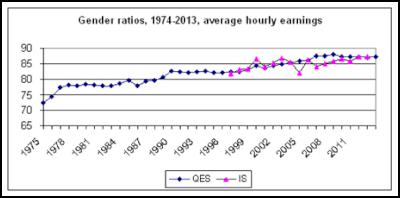Statistics show Government action needed on gender pay gap
Pay Equity Coalition Challenge
Press Release - 4 October 2013
Statistics show Government action needed on gender pay gap
“The income figures from the New Zealand Income Survey released today show that there is no progress in reducing the gender pay gap,” says spokesperson for the Pay Equity Challenge Coalition, Angela McLeod today.
“Using average hourly earnings there remains a 13% gap between what men and women are earning”.
“The Pay Equity Challenge Coalition uses average hourly ordinary time earnings for the gender pay gap. It is the indicator that the New Zealand Income Survey has used since 1974 to monitor the impact of the Equal Pay Act 1972. (See graph below).
“The Government continues to cite median hourly earnings to indicate the gender pay gap, which suits them as it makes the earnings gap appear narrower. But a far bigger proportion of men than women are at the really high end of the distribution (top 5% or 1% of earnings). The median takes much less account of this than the average. But there is no narrowing of the gap even with the median. In fact there is an increase from last year from 9.3% to 10.1% for part timers and full timers combined.
The difference between the gender pay gap indicators - the gap between the average and median measures of the gap - suggests that women in higher paid jobs and occupations may be gaining ground, while women in many typical women's jobs –caregivers like Kristine Bartlett – whose case is before the Employment Court continue to be undervalued and underpaid relative to men.
“These statistics show that there is a need for Government action to reduce the gender pay gap”.
Angela McLeod says “the Pay Equity Challenge Coalition believes that the focus of policy should be on lifting the wages of low-paid women workers. The judgement of the Employment Court in the caregiver case gives the signal for low pay in female dominated sectors such as aged care to be rectified and is an opportunity for government leadership in this sector”.

Click for big version.
Ends.


 Gordon Campbell: On The Parental Panic Over Young Kids Online
Gordon Campbell: On The Parental Panic Over Young Kids Online NZCTU: Unions Barred From Budget 2025 Lock-Up
NZCTU: Unions Barred From Budget 2025 Lock-Up Local Water Done Well: Local Water Done Not So Well | Public Understanding And Confidence In Framework Severely Lacking – New Data
Local Water Done Well: Local Water Done Not So Well | Public Understanding And Confidence In Framework Severely Lacking – New Data New Zealand Police: Statement Regarding Jevon McSkimming
New Zealand Police: Statement Regarding Jevon McSkimming Climate Liberation Aotearoa: Climate Activist Draw Attention To Outdated Regulations Of Heli Tourism In Aoraki National Park
Climate Liberation Aotearoa: Climate Activist Draw Attention To Outdated Regulations Of Heli Tourism In Aoraki National Park The New Zealand Remembrance Army: Victoria Cross And Hardham Cup Come Together For First Time In Over 100-years
The New Zealand Remembrance Army: Victoria Cross And Hardham Cup Come Together For First Time In Over 100-years Queer Endurance in Defiance: Wellington Queer Communities Protest Against NZ First’s Anti-Trans Bill
Queer Endurance in Defiance: Wellington Queer Communities Protest Against NZ First’s Anti-Trans Bill


